Several orangutans and bonobos from the San Diego Zoo received an experimental vaccine COVID-19 developed specifically for animals. They mark the first non-human primates known to receive the injection.
An orangutan named Karen, who made history in 1994 as the first monkey in the world to have open heart surgery, was among those who received the vaccine, according to National Geographic.
Last month, Karen, along with three other orangutans and five bonobos from the zoo, received two doses of each vaccine, which was developed by the veterinary pharmaceutical company Zoetis.
“This is not the norm. In my career, I did not have access to an experimental vaccine so early in the process and I did not have such a strong desire to want to use one,” Nadine Lamberski, San Diego chief health and conservation officer Zoo Wildlife Alliance, told Nat Geo.
Brent Stirton, Getty Images for National Geographic
In January, eight gorillas from the zoo became the world’s first great apes to positive test for coronavirus. They are now recovering.
Infections have also been confirmed in dogs, cats, mink, tigers, lions and many other animals around the world. However, great apes are a particular concern among conservationists.
All gorilla species are listed as endangered or critically endangered on the IUCN Red List, with “disease susceptibility” as a major threat. Infections spread rapidly among animals, who live in close family groups.
COVID-19 has the potential to exterminate populations of gorillas, chimpanzees, orangutans and bonobos if humans do not take steps to prevent their spread, experts warned.
Zoetis started developing a COVID-19 vaccine for dogs and cats after the first dog positive test for the virus in Hong Kong for over a year. It was considered safe and effective in October – but the tests were only done on dogs and cats.
Still, Lamberski decided that vaccinating the great apes was worth the risk. She told National Geographic that they have not experienced any adverse reactions and will soon be testing for antibodies to determine whether the vaccines were successful.
Brent Stirton, Getty Images for National Geographic
“It’s not like we randomly take a vaccine and apply it to a new species,” she said. “A lot of reflection and research is done – what is the risk of doing and what is the risk of not doing. Our motto is, above all, do no harm.”
Lamberski said that because vaccines are made for a specific pathogen and not for a specific species, it is common to give a vaccine for one species to another. Monkeys at the zoo receive flu and measles vaccines developed for humans.
A Zoetis spokesman told National Geographic that other US zoos have requested doses of the vaccine for their own great apes. The company expects more products to be available in June.
In addition, the company is currently conducting mink vaccine tests – tens of thousands of which due to COVID-19.


